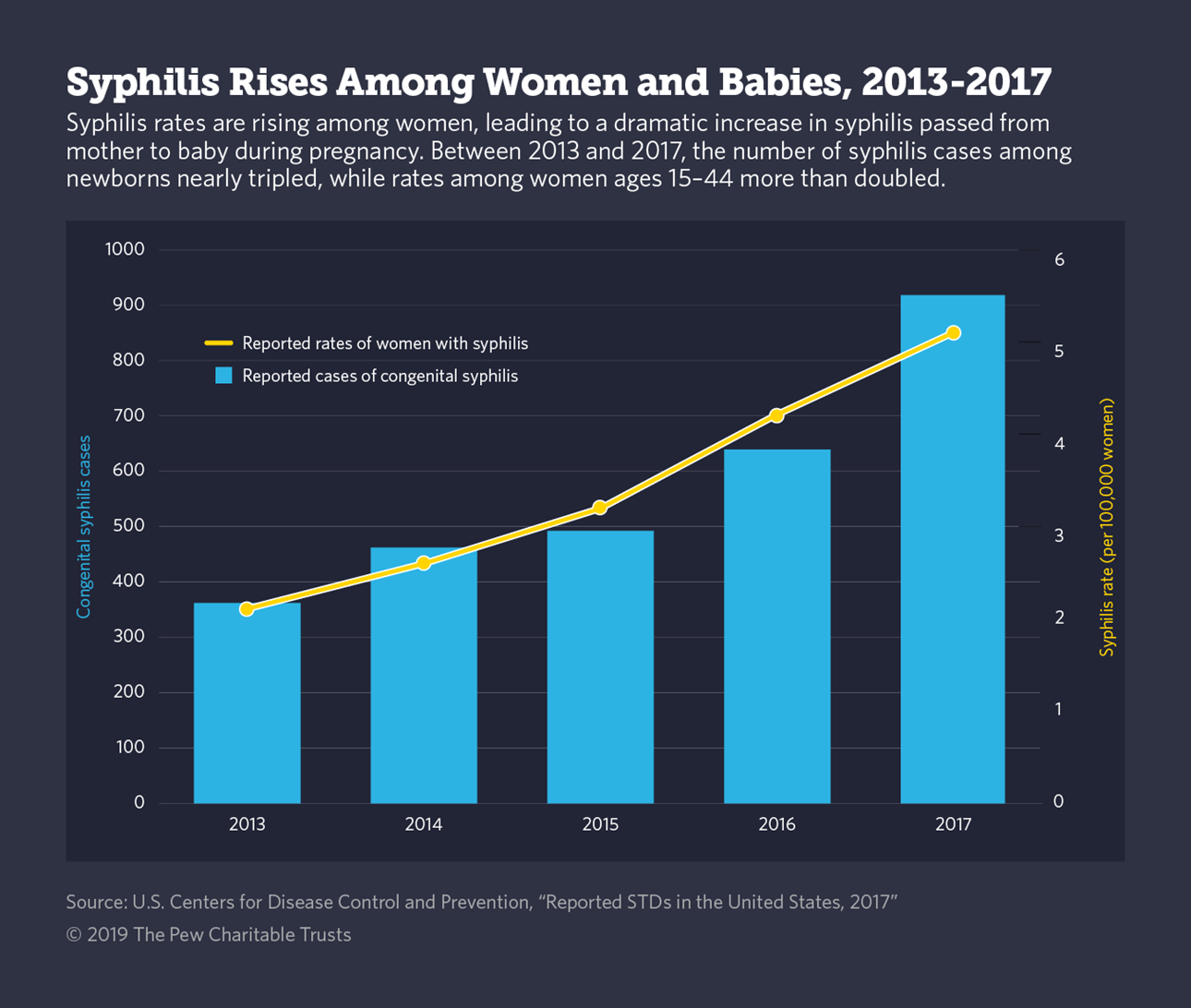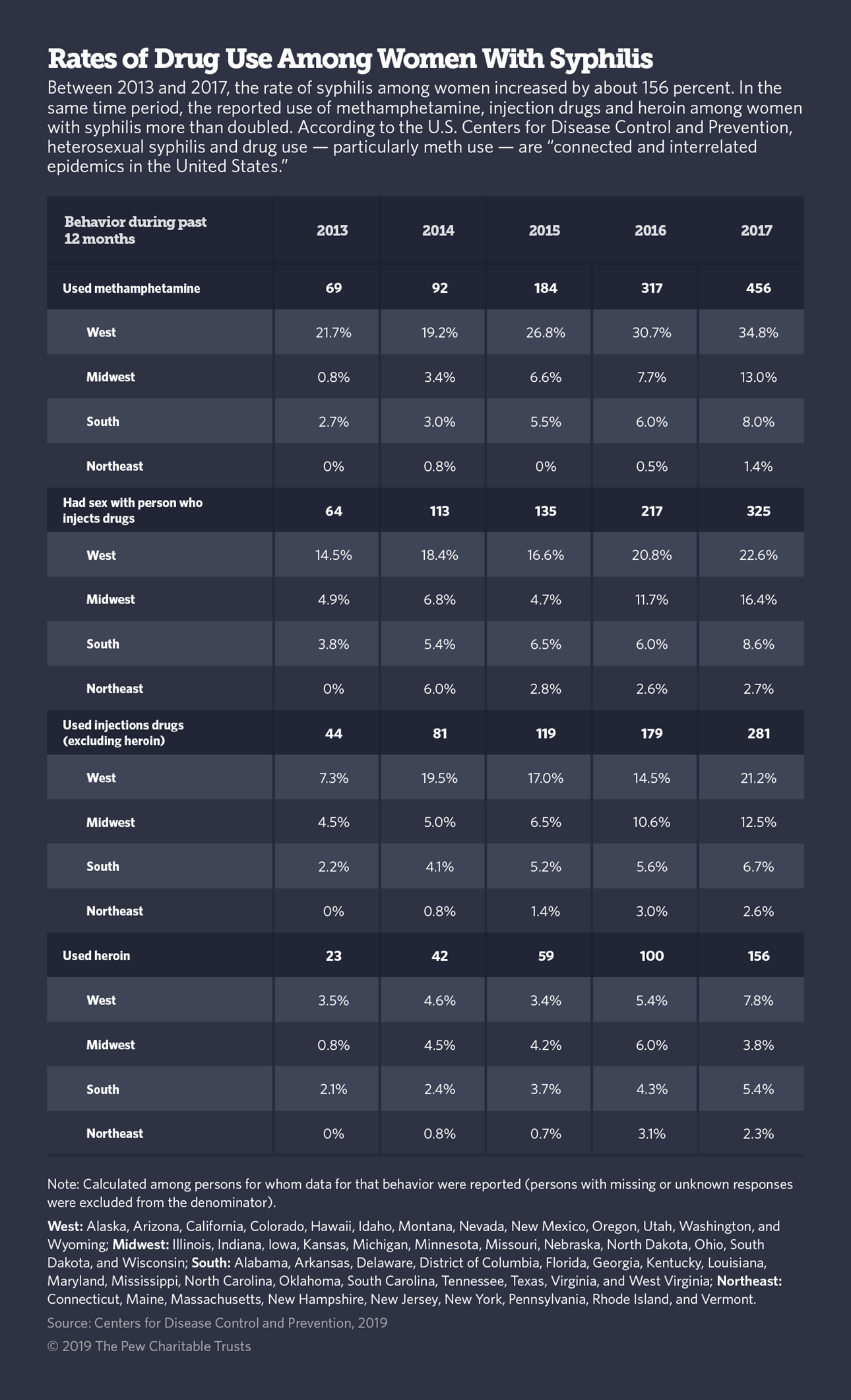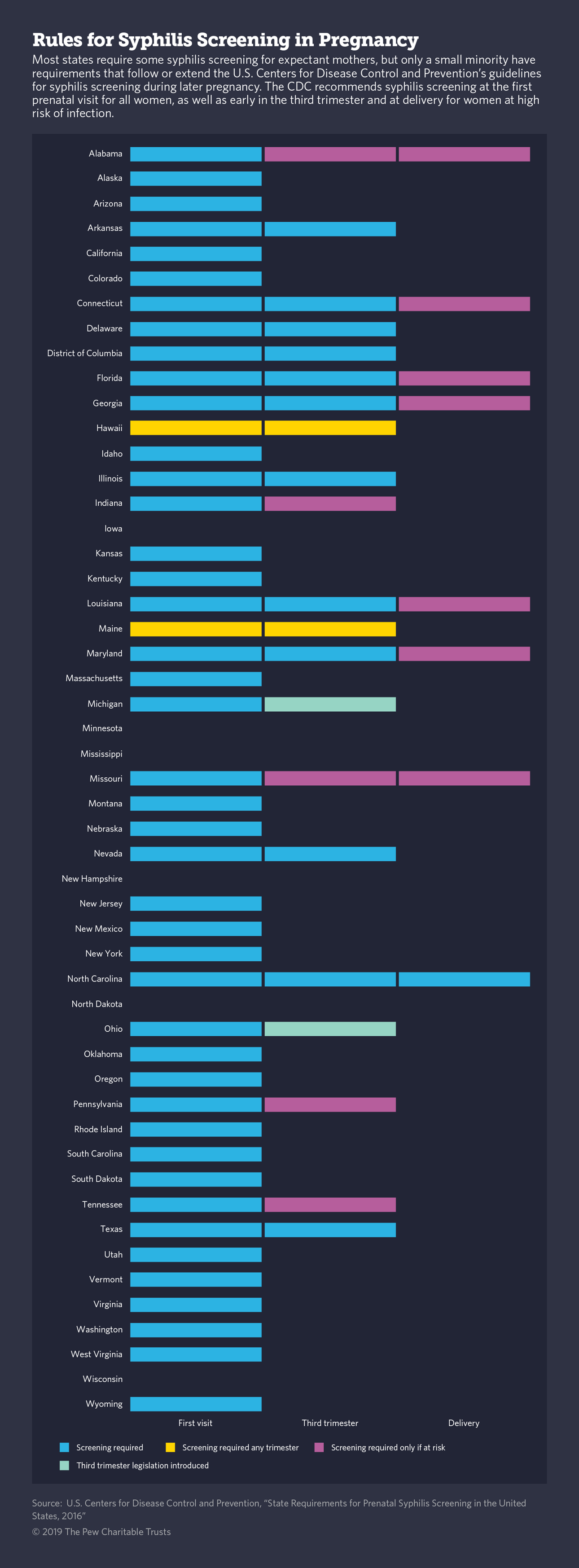Connecting state and local government leaders
Syphilis among newborns can cause deformities, severe anemia, an enlarged liver and spleen, jaundice or brain and nerve problems such as blindness or deafness.
This story was originally published by Stateline, an initiative of The Pew Charitable Trusts.
Some of the communities hit hardest by the opioid epidemic and a related methamphetamine spike also are facing another health crisis: a steep rise in syphilis.
It isn’t a coincidence.
Many opioid users have started to use meth, either in combination with opioids or as a cheaper, more accessible alternative. Stimulants such as meth are even more likely than opioids to promote risky sexual behavior that increases the likelihood of contracting syphilis and other sexually transmitted diseases.
Women are increasingly susceptible as their drug use continues to rise, and more of them are passing on the disease to their infants—with deadly results.
Many addicted pregnant women forgo prenatal visits for fear of being drug tested and losing custody of their babies, doctors say. And mothers with untreated syphilis have an 80 percent chance of infecting their unborn babies, contributing to a growing crisis that many states have tried to combat in recent years.
In adults, syphilis can be cured with a course of antibiotics. But syphilis among newborns, called congenital syphilis, can cause deformities, severe anemia, an enlarged liver and spleen, jaundice or brain and nerve problems such as blindness or deafness.
Up to 40 percent of babies born to women with untreated syphilis may be stillborn or die as a newborn, according to the U.S. Centers for Disease Control and Prevention.
The number of congenital syphilis cases climbed by 154 percent between 2013 and 2017. More than 900 cases were reported in 37 states in 2017—the highest number of cases in the past two decades.

Sixty-four infants were stillborn in 2017; another 13 died sometime after birth. (The CDC does not have data on how long after birth the newborns died.)
Most upsetting of all, say health professionals, is that all congenital syphilis cases—and all the deaths from the disease—are preventable.
“Every case of congenital syphilis is considered a failure of the health care system,” said Taryn Couture, senior manager of policy and government relations at the National Coalition of STD Directors, “because it should be caught in the first prenatal visit that every woman has.”
The use of meth, heroin and other injection drugs among women with syphilis more than doubled between 2013 and 2017, according to a CDC report released this month. The report doesn’t include data on opioids other than heroin, but CDC spokesman Brian Katzowitz said the agency plans to add that information to future reports.
Despite the missing data, Couture said, “There’s a clear connection, as we’re seeing, between drug use, the opioid crisis and the rise of syphilis and congenital syphilis.”

Syphilis transmission is most common among men who have sex with men, and those cases accounted for most of the 30,000 syphilis infections reported in 2017.
But cases among heterosexual men more than doubled between 2013 and 2017—a spike that signifies “heterosexual syphilis and drug use, particularly methamphetamine use, are connected and interrelated epidemics in the United States,” according to the new CDC report.
Meanwhile, more women are becoming infected: from 1,500 in 2013 to 3,722 in 2017. In many states, public health officials are witnessing the interconnected epidemics firsthand.
In Kentucky, the “main reason” for an outbreak of congenital syphilis in late 2017 was “the prevalence of opioids,” said Chang Lee, program director for the STD Prevention and Control Program at the Kentucky Department for Public Health.
Angel Stachnik, senior epidemiologist at the Southern Nevada Health District, estimated that nearly half of the congenital syphilis cases among infants in her region “involve some type of substance abuse,” meth tending to be “high-prevalence.”
Pinpointing the Problem
Women who have received late or no prenatal care make up about a third of those who give birth to babies with congenital syphilis, according to Virginia Bowen, an epidemic intelligence service officer at the CDC.
Even women who do receive early prenatal care aren’t entirely in the clear, health professionals say, because they might miss opportunities to get treated, or to be re-screened in late pregnancy.
The CDC recommends syphilis screening at the first prenatal visit for all women, as well as early in the third trimester and at delivery for women at high risk of infection.
All but six states—Iowa, Minnesota, Mississippi, New Hampshire, North Dakota and Wisconsin—require prenatal syphilis screenings.
Most require women be tested at the first prenatal visit, though 17 states have screening requirements in a woman’s third trimester as well, either for all pregnancies or for those considered at high risk of infection.

Still, many pregnant women—particularly women of color—are slipping through the cracks. In 2017, nearly 39 percent of congenital syphilis cases, in which the race of the mother was known, were newborns with black mothers. Black mothers were more than six times more likely than white mothers to give birth to a baby with syphilis.
“A lot of the problem is non-awareness among physicians of the burden that’s in their community,” said Sandi Larson, Nevada’s state epidemiologist. “Specifically, in some of our rural communities, physicians don’t see syphilis; they don’t test for it—it’s just not on their radar.”
Women, too, don’t always know how best to protect themselves against STDs. One in three women who gave birth to a baby with syphilis in 2016 did get screened during pregnancy, but either acquired the disease after being tested or were not treated in time to prevent the infection of their newborns, according to the CDC.
Tackling Troubling Trends
Experts say states need money to raise awareness and provide treatment. Federal opioid funding, largely reserved for fighting HIV and hepatitis C, has left the fight against syphilis behind, Couture said.
Still, officials at the CDC say they’re trying to focus on low-cost efforts. In 2015, the agency’s Division of STD Prevention “started to look really closely at what causes and factors were at hand,” Bowen said, “and try to unpack what the missed opportunities are in a woman’s life that ultimately lead her to deliver a baby with congenital syphilis.”
Based on their findings, CDC researchers offered guidelines for clinicians to intervene and prevent congenital syphilis.
“But we do understand that there’s a second layer involved here, and it’s not all clinical interventions,” Bowen said. “The layers reflect how complicated these women’s lives are — it’s not just as easy as saying, ‘You just need to get to the doctor for prenatal care.’”

NEXT STORY: Chicago Mayoral Election Could Bring a ‘Nightmare Scenario’



